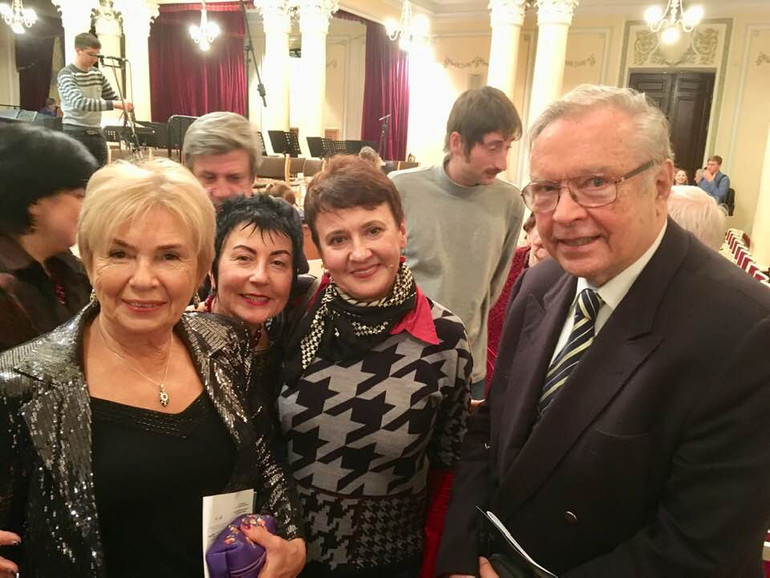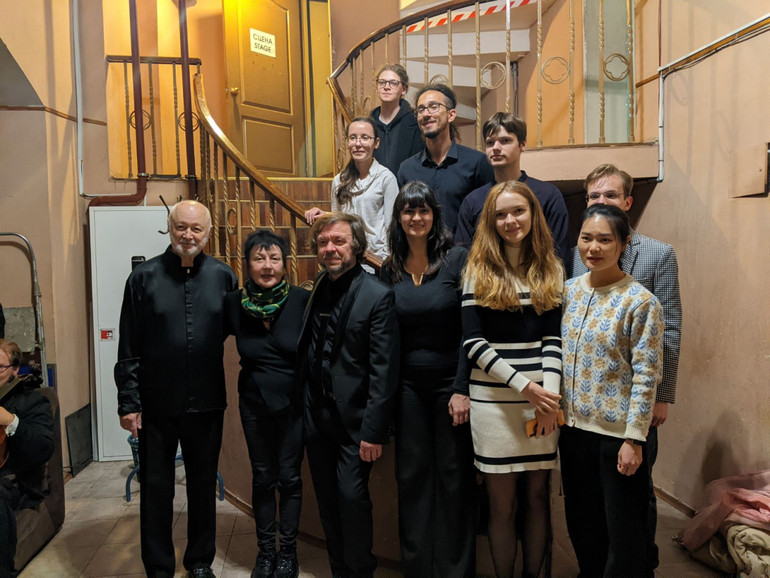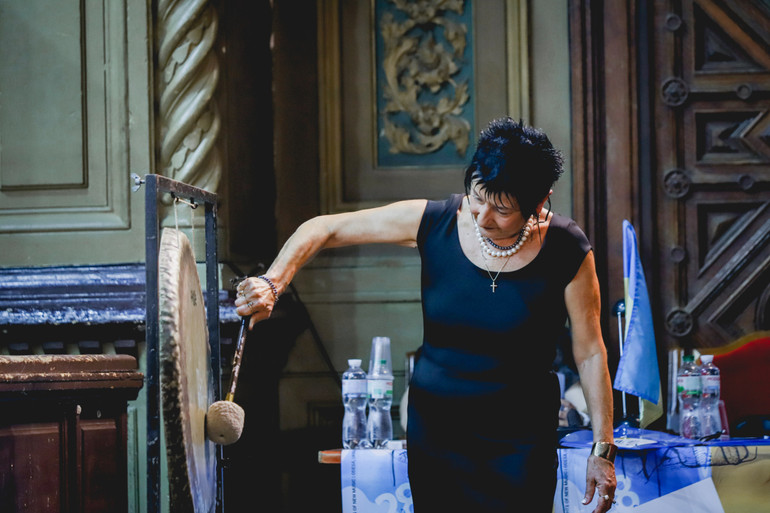Shevchenko laureate Carmella Tsepkolenko – interview
[ad_1]
She wrote these works in the darkness of the siege of Odessa in the spring of 2022: in the cantata “Reading the story”, “Where are you from, black walko, the bird will flock”, duet duet No. 14 and symphony No. 5, the composer Carmella Tsepkolenko added poetry Oksana Zabuzhko and Serhiy Zhadan.
Two years later, she appeared on the stage of the Franko Theater in Kyiv to receive the Shevchenko Prize for her music.
Mrs. Carmella was born in Odesa and does not leave the city even in the most difficult days. But she is known far beyond its borders – on the official page of the Shevchenko Committee, in the “comments” section, the composer left the most reviews among all other laureates of this year’s award. They wrote from Japan, Austria, Switzerland, Germany, Poland, of course, from Ukraine.
In her native Odesa, Carmella Tsepkolenko takes care of the “Two Days and Two Nights of New Music” festival she founded, teaches composition to students of the Nezhdanova Odesa National Academy of Music, and constantly writes new works.
Music columnist UP. Culture Natalka Pysanka testified that despite tragic events in Odessathe composer does not lose hope and inspiration.
– Tell us about your emotions when Volodymyr Sirenko announced your name from the stage – conductor and Shevchenko laureate.
– The excitement was very great, although I, as a creative person, performed on stage more than once. I prepared to say something there, but when I turned to the hall, I understood: what I was thinking of saying – all this does not mean anything, because I saw many of our soldiers who protect us, who, perhaps, are only from the front line. I don’t know what I said anymore, but I spoke generally for them – for them to hear me, to feel that respect, gratitude for the fact that we work here under their protection.
– Do you remember the process of writing award-winning works?
– It all happened in 2022. I was writing the Seventh Symphony, and when the full-scale invasion began, I put the score down. Desperation, shme… We saw Russian ships in the sea, standing on a raid and waiting for the weather. But, fortunately, the Russian landing force did not manage to land.
There was fear, horror, a sense of helplessness. But little by little we saw how the city was getting stronger, and that was reassuring. About two weeks later, I returned to work again.
Suddenly I hear: “Knock-knock-knock!” – A cellist, a pianist and a soprano (ensemble Senza Sforzando: Tetyana Mulyar-Ohorodnyk – soprano, Evgeny Dovbysh – cello and Oleksandr Perepelitsa – piano). “Carmello, can you write an essay for us? We could learn everything here, play, give a concert even at home.” I was very excited. She found the text very quickly (“Reading the story” by Oksana Zabuzhko), wrote the cantata in two or three weeks, and we immediately began to analyze it. Then they invited everyone who wanted to come to our house for a concert, made a recording (an edited fragment of this recording is on the video that is played during the award ceremony)
Karmella Tsepkolenko / Facebook
Then I received an order from the Viennese vocal quartet “das Ensemble REIHE Zykan +”, they asked for the lyrics to be in German because it’s easier for them to sing that way. I called Zhadan, and he says: this is already the translation of my poem! – Just the one I chose for the cantata. I wanted to convey this horror, these explosions, rockets, sirens in musical language. Once, during a rocket attack, we were sitting in our shelter somewhere in the basement and I said to my friends (then we had a large company from Kherson and Odesa): you make a siren, someone makes a shell explosion, someone – air defense
The piece was written in about 3-4 weeks, the premiere was in October 2022 in Vienna, then the cantata was performed several times at festivals, it is already in the collective’s repertoire. Then immediately came an order from Switzerland from the duet of violinist Gabriel Brunner and double bass player Ivan Nestich, with whom I have already worked more than once. And after that – an order for the festival in Chisinau, for which I made a second edition of my 5th symphony. That is, all works were written and performed for the first time in 2022.
– Is it possible to build a storyline that connects these works?
– These works are combined by the state of the artist. You cannot go and defend your country – you just can’t, but you have to react somehow. And you should write so that the listeners feel this tension, this indomitability of our people. For example, in Duel-duo I used the slogan “Glory to Ukraine!”, but it is pronounced on the exhale in the letters: с-л-а-в-а У-к-р-а-и-н-и – during the performance of the work .
– All four works were performed abroad. Was there feedback from colleagues?
– I did not follow this, but I know that the Viennese Quartet was initially afraid to put my cantata in the program, because this work is not easy for the average listener to understand. But before going to the big festival, they presented the cantata at a concert. And the listeners were delighted.

Carmella Tsepkolenko and Oksana Zabuzhko (center)
Lessia Oliinyk / Facebook
– By the way, about “difficult music”. Where should the “average” listener start listening to modern music?
– We must start with the music of the 20th century: Schoenberg, Webern, Berg… Listen to Ukrainian composers – Lyatoshinsky, Stankovich, Skoryk, Sylvestrov. And be sure to go to concerts! True, there are composers now who try to pay homage to the past century, but I always say that you cannot write better than Chopin and Mozart. You have to find your own way.
Among the winners in the “Musical Art” nomination, we see two female names – yours and Jamal’s. Do you think this is a fluke or a trend?
I believe that it is not necessary to separate male and female composers. Because when you write music or poetry or paint, you can be neither a man nor a woman. “This is women’s music”, – so they said in Soviet times. when i write – I don’t know who I am! When we write out male characters in opera – do we do it as women? – Probably not. When an artist composes, he has no gender.
– What is the current situation with the “Two days and two nights of new music” festival?
– In 2022, we missed the festival. But 2023 was held for the 28th time. It was not in April, as usual, but in August. Composer schools from different countries were represented, the performers were mostly Ukrainian, only Polish musicians came from abroad.
We are planning the next festival in August 2024, the people of Vienna really want to come to us with the Zhadan project. But we still don’t know how it will turn out. The main thing – the festival continues and we hold on.

After the concert of the National Odessa Philharmonic Orchestra
Karmella Tsepkolenko / Facebook
Ever since 1995, when the first festival was held, we have educated a whole constellation of listeners who cannot live without the festival. It’s not just musicians. These are engineers and architects. They were simply surprised by what they brought to us in Odessa. At first they said: we do not understand you. And the music is impossible to understand! It must be felt.
Here I have the work “Subrosa” (or “Garden of Female Composers”). The name is deciphered from the Latin “in secret”. I could not understand its meaning for a long time. But once she was sitting near a rose bush, reading a book. And suddenly I see – what’s going on there! There, under the petals, there are bugs and midges – who loves, who fights, who flatters someone… This is subrosa. We just came up and don’t see it, but if we observe – then this is life in secret. Under the rose. This is the essence of art: everything is a secret (laughs)
– Since you have been working with students for many years, I cannot but ask about the situation that has developed around art universities. Do you support the initiative so that the applicants of these universities do not take the external examination, but enter only on the basis of creative competitions?
– I think everyone should take the final exam. Music – it is both mathematics and architecture. For example, a freshman came to my conservatory, she is studying at a mathematics university. She has a musical education – only music school. But in half a year, she made a big leap, and understands exactly what needs to be done better than other students.
Let us recall the composer Xenakis, who studied architecture and then went into music. Or Ligeti, who first planned to study physics and mathematics, and then used this knowledge in his works. Math – an integral component in the schematic of a musical work.

Contrasts International Festival of Contemporary Music / Facebook
– If you had not become a composer, what would you be doing?
– A difficult question. If you have already become a composer, it is difficult to imagine yourself as someone else. But I, for example, collect sea stones and make figurines from them. I can paint something, until 2000, all my scores were painted – not on every page, just the highlights. I like to do everything related to art. I also like to cook and bake cakes.
– Why is modern music important, especially now in our time of war? What can she tell Ukrainians and the world?
– Each of us has our own weapon. “Beat the drums, fear nothing” – these are Heine’s words. You say they don’t understand modern music. She was never understood. This was the case with the music of Mozart and Beethoven. Artists should be a little ahead.
[ad_2]
Original Source Link











